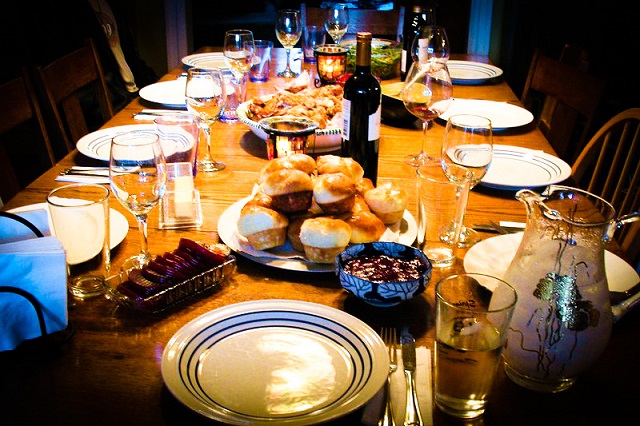LGBTQ+ Holiday Survival Guide
By: Michael Toohey, Psy.D. | November 8, 2019

The holidays are times of joy and sharing, and so it should be for the LGBTQ+ community too. The holidays for that community can include times of particular stress as we return to our original families to celebrate the season. Some families show more affirming acceptance than others.
The holidays present stress for many although our community has some unique stressors to navigate. Such stressors range from pronoun slips to partners being referred to as your ‘friend’ or ‘roommate.’ Perhaps you are told that you and your spouse must sleep in separate beds. Perhaps you are accused of ‘ruining the holiday’ if you don’t slip back into the closet for the sake of your third-cousin-once-removed who does not know you’re out.
How do we stay sane during this time? A valid alternative is not to return to the homes in which we were raised but rather to stay with our chosen LGBTQ families. For those who do return, Liz Owen suggests a series of strategies to take care of ourselves (strategies following are taken from PFLAG.org):
-
- Don’t assume you know how someone will react to the news of your sexual orientation or gender identity. You may be surprised.
- Realize that your family’s reaction to you may not be because you are LGBTQ. The hectic holiday pace may cause family members to act differently than they would under less stressful conditions.
- Remember that “coming out” is a continuous process. You may have to “come out” many times.
- Don’t wait for your family’s attitude to change to enjoy the special holiday season. Recognize that your parents need time to acknowledge and accept that they have an LGBTQ child. It took you time to come to terms with who you are; now it is your family’s turn.
- Let your family’s judgments be theirs to work on, as long as they treat you kindly.
- If it is too difficult to be with your family, create your own holiday gathering with friends and loved ones.
- If you are transgender, be gentle with your family’s pronoun “slips.” Let them know you know how difficult it is.
- Take the lead in setting boundaries if there are topics you believe will cause upset, such as the political climate or current events.
- It can be easy to lose ourselves. Stay connected to who you are.
Before the visit…
-
- Make a decision about being “out” to each family member before you visit.
- If you are partnered and plan to visit with family together, discuss in advance how you will talk about your relationship or how you will share affection with one another.
- If you bring your partner home, don’t wait until late into the holiday evening to raise the issue of sleeping arrangements. Make plans in advance.
- Have alternative plans if the situation becomes difficult at home.
- Find out about local LGBTQ resources.
- If you do plan to “come out” to your family over the holidays, have supportive resources available.
- Engage with friends to make a plan for your visit with family. Set up phone dates or video chats. Ask if you can email them and determine whether you would need an immediate response to balance out your obligatory socializing with more rewarding and enjoyable interactions.
- Find out which friends or family are open to emergency phone calls.
- Have friends write you supportive notes that you can read during the difficult moments.
During the visit…
-
- Focus on common interests.
- Avoid discussing politics!
- Reassure family members that you are still the same person they have always known.
- If you are partnered, be sensitive to their needs as well as your own.
- Remember to affirm yourself.
- Realize that you don’t need your family’s approval.
- Connect with someone else who is LGBTQ—by phone or in person—who understands what you are going through and will affirm you along the way.
- Take some alone time – go for a walk, read a book, journal, meditate, listen to music, exercise.
Have Boundaries!
Discuss with your therapist or friends you trust the possible boundaries to have with your family. What do you need to feel safe? What is realistic? What’s the difference between unsafe and uncomfortable? What are you willing to deal with?
Make and maintain some boundaries for yourself, yet know that other boundaries have to do with other people’s behavior, in which case it is important to determine whether to communicate these boundaries to the other person or not. Determine what will you do if your boundaries are broken. Here are some examples of boundaries:
-
- I will not tolerate it when my mother talks about my body in any way. If she does, I will ask her to stop. If she does not stop, I will walk away from her. I will communicate this boundary to her in an email before I arrive at her house.
- I will not allow my family to call my partner my “friend.” We have been together for years, and they are aware of the nature of our relationship. I will correct them when they say it.
- I will not drink alcohol with my family or be around them when they drink heavily. Should they start with that, I will excuse myself politely and go to my room to read, call a friend, or go for a walk. I will speak to my parents on the phone before I get there to inform them of this boundary.
- I will not listen to political debate or discussion. I will leave the room or change the subject.
Have a conversation ahead of time if you have a friend or partner coming with you. Decide what each of you would like from the other in terms of support. How will you ask for it? What would that support look like? What if the other person isn’t able to give that support? Remember, this might be difficult for both of you at some moments. Be compassionate.
We may not be able to change others’ behavior but we can choose to manage our own reaction to it.
What to pack if you’re staying the night…
-
- Be sure to pack things that keep you connected to who you are – photos of friends, a favorite book, maybe even your pet.
- Pack things that comfort you – special pillow, scented candle, favorite bath products, food that makes you feel good.
- Pack coping tools – books, journals, favorite music, walking or running shoes, guided meditation.
After the visit…
-
- Connect with your regular support community on your way home or immediately when you get home.
- Plan a fun activity with your friends or circle of support back in your community to decompress. Enjoy some holiday cheer among your chosen family.
- Acknowledge and affirm yourself for utilizing your coping skills.
The best boundary to set…
Of all these coping strategies, I believe limiting the use of alcohol or other substances is the best boundary to set ahead of time. Members of the sexual minority have higher instances of substance misuse than our heterosexual counterparts, making the added stressors of going to a less-than-affirming home push our use to misuse or even abuse. We rationalize our over-doing with ‘I’m enjoying some holiday cheer!’ or ‘I need a drink to get over these shakes to get through this day’ or embarrassing questions to self such as ‘My, I’m hungover and how did the night end?’
Plan ahead how much you’re willing to imbibe and resolve to stick to those limits!
And now, I wish you a safe and happy holiday season!
Image: Mr.TinDC on flickr and reproduced under Creative Commons 2.0



